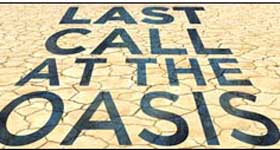We saw a new documentary, Last Call at the Oasis, directed by Oscar winner Jessica Yu and from the producers of The Inconvenient Truth and Waiting for ‘Superman’ and Food, Inc.
The film’s impressive credentials also include being based on best-selling author Alex Prud’Homme’s book The Ripple Effect and featuring Erin Brockovich, the real-life character that Julie Roberts personified and won her Best Actress Oscar in Erin Brockovich. (Which is probably a movie we’ll go back and see again, now).
We mention all those credentials to help convince you to see Last Call. Right up front we’ll admit that it is a case of being ‘good for you’ and ‘important.’ And, we hope that the filmmakers will succeed in creating a national conversation about this vital — and frightening — issue.
Documentaries have learned to be as entertaining as educational, and the filmmakers employ humor, clever graphics and a varied cast of characters to raise our consciousness and help us figure out how to change our habits and make a difference. It all boils down to this:
We are running out of water. If you thought the oceans could save us, think again. Turns out, all that seawater is too expensive to convert to a potable grade beverage, so it comes down to conservation and… re-purposing, recycling, and re-using the water we’ve got. Including sewage. Some of the film’s best fun is had by asking an ad agency to create a campaign to get consumers to drink recycled sewage water. With Jack Black doing the ads, this is pretty funny stuff.
Of course, no one wants to believe there is a crisis, at least not as long as there is water coming through the tap. There is an image in the film of a woman washing dishes with out water (which will give you pause) and plenty of scientists making statements about the dire situation. And, more alarmingly, a group of farmers from the Central Valley devolving into regional squabbles after listening to UIrvine experts telling them how quickly their land could dry up. Coming on the heels of images of dust-bowl farms in Australia, this sequence has the tone of a scary movie.
The film’s website has suggestions for how viewers can help at home – most of our kids come home from school with tips about turning the water off while brushing your teeth, but do we extend our vigilance beyond doing one-or-two things, here and there? Watching this movie makes you think about more far-reaching changes.
What are doing to conserve water and what pledge can you make to do better?


